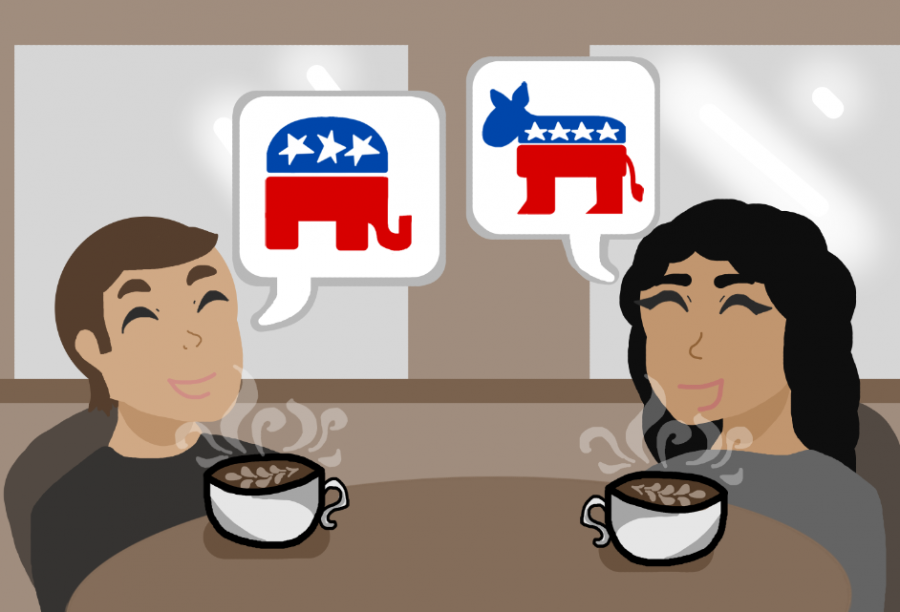OPINION: Open mic could bring community together post-election
2020 election has been divisive; open mic night seeks to bring people together
The open mic night is intended to bring students together post-election as a means of destressing and unwinding.
November 3, 2020
Election Day is today, and one way or the other, everyone is braced to bear for impact. Partisan divides and continued pandemic measures keep the political tension scorching. It’s easy to feel more distanced from your community than ever before, whatever form it may take.
If you can make it through Election Day without ripping out your hair, you might be able to find an outlet for your stress while getting back in touch with Pullman and the campus community at the same time. Poets, writers and onlookers are invited to virtually interact with “polis is community,” an Open Mic night. The event begins at 6 p.m. Nov. 5 via Zoom. People can participate in a creative event that’s both individualized and collaborative, either by writing, sharing writing, or simply listening to your peers.
If you’ve ever attended Open Mic night before, then you might have been lucky enough to experience it at Café Moro, a small coffee shop and restaurant in Pullman. It was easy to foster a sense of community in such a friendly, intimate place. Unfortunately, Café Moro closed down from COVID-19 struggles this past summer, and will not be reopening.
It is a poignant reminder of the ways our “ordinary” life has been altered. A full return to “normalcy” may not happen anytime soon, post-pandemic or post-election, but carrying on the Open Mic tradition is one of the first steps towards redefining the ways we can craft and connect with new distance communities.
Poetry provides a means to express feelings of frustration, discouragement or loneliness in whatever way they need to be processed, and sharing the experience is a reminder we are all together in this tumultuous new reality, although at a distance.
Ally Pang, Campus Civic Poet, said one-way poetry can act as a tool of community is through slam poetry. She said slam poetry functions uniquely from ordinary written poetry because it allows the reader to speak directly to the audience and carries a more immediate potency off the page shaped by its verbal delivery. Slam poetry, at least the way Pang uses it, captures the emotional significance of a moment in time and compels the audience to feel it too. She described a high school slam poetry performance she participated in where she noticed people actually stop in passing just to listen.
“It’s almost like music. It’s like acappella,” Pang said. “I think the thing behind slam that is so different … is it’s the closest you can get to music if you’re not musically-inclined.”
Pang’s slam poetry often captures personal experiences that were emotionally striking. She even made a slam poem about the messy experience of her first slam poem, which unintentionally motivated her to continue practicing, Pang said. Because of how slam poetry is expressed and how it’s naturally predisposed to tackle topics of inequality or personal injustice, slam poetry is entrenched in the idea of relatability and community-building. The first slam poem I ever heard was my English teacher in high school relating the experience of encountering a mansplainer in Home Depot.
Colin Criss, poet and instructor in WSU’s English department, said it is the duty of the poet to strive for a narrative “we,” challenging writers to not just share an experience but to relate it as a piece of the human experience more than one kind of person can relate to. When it comes to a post-election Open Mic, stories that bridge gaps are vital to fostering the message of how a community comes from inclusivity, not exclusivity.
Colin points out the narrative “we” can’t include every listener. It can, however, contextualize a poet’s perspective and why it differs from someone else’s. Recounting stories of discriminations faced or decisions made can also put them into context for the writer, because poetry, and writing in general, can act as a mirror of the writer’s ingrained ideas of bias, “proper writing” and behavior.
The Open Mic theme — polis is community — refers to bringing together different angles of the human experience as much as it refers to bringing together different styles of writing. There is no one right way to be human or to be a poet, and after such a turbulent year leading up to a turbulent election, the reminder is more important than ever. If you have a free evening, you need to unwind some tension.
If you’re interested in hearing fragments of life from lots of very different people, then you should drop into the virtual Open Mic with Ally and Colin this Thursday.










